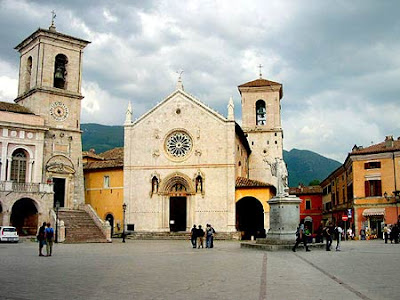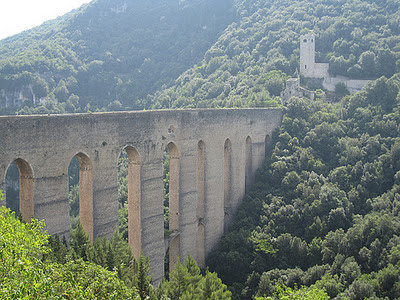Beautifully decorated, the scenes in the upper church relay the story of Saint Francis, who was called the alter christus.
 |
| Frescoes in the upper church |
It is worth a stop at the church Santa Maria degli Angeli just a few minutes drive outside Assisi on the lower flat plane. Like the russian babushka dolls, this large late sixteenth century basilica was built to house and protect, like a reliquary, the small ninth century church, called Porziuncola, on the inside.
 |
| La Porziuncola |
In Francis’ time this was woodland and he and his first followers came to pray and camp at the beginning of the 1200’s.
 |
| Saint Francis dressed in his brown habit held by a rope knotted three times, symbolically representing poverty, obediance and chastity. Often he is represented with the five wounds of Christ, he was the first Christian to receive the miracle of the stigmata, in 1224. |
An extremely sacred site for all Catholics here, as in Assisi, one can feel the weight of faith from the visitors. Further back in the church there is the site where Francis died in 1226, another a site for pilgrimage.
Thirty minutes drive further south is the hill top town of Spello, which is very pretty, and the church boasts a frescoed side chapel by Pinturicchio from late 1490’s, paid for by the Baglioni family.
 |
| Pinturicchio, Adoration of the Magi, fresco, 1501, Baglioni side chapel, Santa Maria Maggiore church, Spello. |
Other lovely hill top towns in the vicinity are Bevagna and Montefalco. I decided to drive onto and stay overnight in the hill top town of Norcia in south-eastern Umbria.
 |
| The hill top town of Norcia |
Norcia is the birth place of Saint Benedict (c.480-547), the father of European monasticism, but is also renowned for its salumi (pork products), and thus my reason for staying here, as I assumed by default, one could only eat divinely in this particular area, and I was not proven wrong. Norcia is perched on a hill, cuddled by entirely intact medieval walls, and just perfect for the holiday get away experience.
 |
| Spoleto Cathedral |
The following day I visited Spoleto. The Romanesque cathedral’s apse is beautifully frescoed in the 1460’s by the adventurous Florentine Carmelite friar, Filippo Lippi, who ran away with the hot young nun, Lucrezia Buti. The frescoed scenes show in the top apse area the Madonna being crowned by God the Father, surrounded by angels and Old and New Testament figures an below the Annunciation and the Dormition of the Virgin. The colours are spectacular.
 |
| Filippo Lippi, apse of Spoleto cathedral, fresco, late 1460’s. |
Spoleto also boasts a Roman theatre where they do spectacles in the summer, and a fab walk up to the fourteenth century fortress and the medieval aqueduct / bridge linking the two parts of the chasm, is a must. I munched on the local pasta ‘strangozzi’ (similar to spaghetti but square in shape rather than tube-like) at the Trattoria della Lanterna in the historical centre of the upper city, near the ancient Roman theatre.
 |
| Spoleto’s ancient Roman theatre |
On day three, I took a road trip to the high plains and hill top town of Castelluccio, close to the border of Le Marche region, only about thirty minutes from Norcia. The scenery is unexpected and fabulous. Barren, immense, open spaces, wide chasms, and in the base of the valleys there are the lentil fields providing the ingredients for the Umbrian cuisine, sausage and lentils, a staple in this area.
 |
| In the hills of Castelluccio – a spectacular sight |
 |
| Lentil fields of Castelluccio |
I stayed at the Hotel Palazzo Seneca, a renovated fifteenth century palazzo in the historical centre of Norcia, which was sensational. Luxurious, comfy, and elegant with a scrumptious breakfast, it is worth every four stars it has earnt. Dinner at the agriturismo, La Casale degli Amici, two kilometres outside of Norcia, is a must. We all had a mixed antipasto della casa (all the cold cuts from the farm itself) and to follow capretta (goat) with rape (the leafy part of turnips) as a side, and to finish, a goats cheese tiramisu, again all ingredients zero kilometers, from the farm.
 |
| Hotel Palazzo Seneca |
……………..Ahh Italy, how I love you!

















